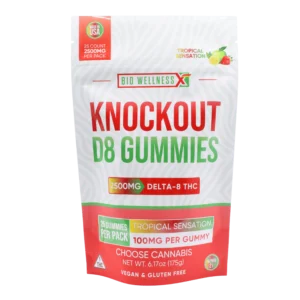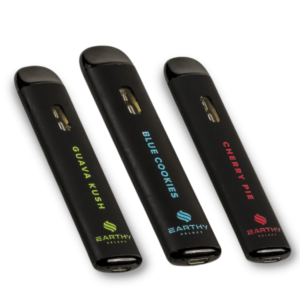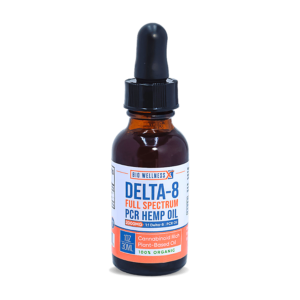Delta-8 tetrahydrocannabinol (Delta-8 THC) is a cannabinoid similar in structure to Delta-9 THC, the primary psychoactive compound in cannabis.
Although it is often marketed as a legal alternative to Delta-9 THC, questions about its detectability in drug tests remain a concern for consumers.
This brief article will explore the chemical composition of Delta-8 THC, its interaction with the endocannabinoid system, and how it relates to Delta-9 THC. We’ll also look into the scientific understanding of whether Delta-8 THC is detectable by standard drug tests, the various testing methods employed, and the sensitivity of these tests to different THC compounds.
Finally, we will discuss the duration Delta-8 THC remains detectable in the body, explore how to minimize risks and address common misconceptions about false positives. We trust that this data will assist you in gaining a better understanding of whether Delta-8 THC is detectable on a drug test.
Key Takeaways
- Delta-8 THC is a cannabinoid found in cannabis plants and has a similar chemical structure to Delta-9 THC.
- Delta-8 THC interacts with the body’s endocannabinoid system by binding to CB1 and CB2 receptors, producing psychoactive effects and potential health benefits.
- Some drug tests may not differentiate between Delta-8 and Delta-9 THC, leading to false-positive results for Delta-9 THC.
- The detectability of Delta-8 THC in drug tests varies depending on the testing method and sensitivity, with urine tests being able to detect it for a few days to a few weeks after use.
Understanding Delta-8 THC: A Detailed Review
Delta-8 THC, or Delta-8 Tetrahydrocannabinol, is a cannabinoid found in the cannabis plant. It is structurally similar to the more well-known Delta-9 THC, the compound responsible for the typical psychoactive effects of cannabis. Delta-8 occurs in much lower concentrations naturally, but advancements in extraction and isolation methods have made it more accessible for commercial use.
Derived from hemp, Delta-8 THC is often produced through a chemical conversion process that transforms CBD into Delta-8 THC. It shares psychoactive properties with Delta-9 THC but is reported to offer a milder, more clear-headed high. Users often describe its effects as a blend of the euphoria associated with Delta-9 THC and the relaxing, sedative qualities of CBN. This has led to Delta-8’s characterization as having indica-like effects, providing potential relief for those experiencing stress or physical discomfort without the intense psychoactive experience of Delta-9 THC.
In terms of legality, Delta-8 THC occupies a gray area. While marijuana-derived Delta-9 THC is classified as a Schedule I controlled substance by the U.S. federal government, Delta-8 is generally considered legal thanks to the 2018 Farm Bill when derived from hemp material.
Today, high-quality Delta-8 products are available in various forms, including 50mg Delta-8 gummies with organic ingredients, disposable vape cartridges, oil tinctures, sugar-free capsules, soft drinks, and more. Users can choose products that suit their preferences and desired effects. However, it’s crucial for consumers to be informed about the sourcing and manufacturing processes of Delta-8 products, as the industry is still evolving, and quality and safety standards may vary.
While Delta-8 THC presents an intriguing alternative for those seeking a more balanced cannabis experience, potential users should approach it with caution, understanding their local laws, product sourcing, and individual tolerance levels.
Delta-8 THC and Drug Tests: What the Science Says
So now that we know what Delta-8 THC is, will this compound cause a hiccup when taking a drug test?
The short answer is, yes, it most likely will.
You see, most current drug tests out there are on the lookout for THC. The problem is, that these tests aren’t necessarily particular about the type of THC they’re looking for. They can’t really tell Delta-9 THC apart from its cousins Delta-8 THC and Delta-10 THC.
Now, even though Delta-8 THC is a bit of a chameleon, it still has a similar chemical structure to Delta-9 THC. This means it can create the same types of leftovers, or metabolites, in your body that drug tests are trained to spot.
What this all boils down to is that if you’ve enjoyed some Delta-8, it could very well lead to a positive drug test.
It’s a tricky situation, especially if you’re facing a workplace drug testing or have an upcoming drug test for any reason. Whether it’s a urine test, hair test, blood test, or saliva test, Delta-8 could be the uninvited guest that crashes the party and leads to a positive test result.
So, before you decide to use Delta-8 THC for personal reasons, like managing pain or just unwinding after a long day, it’s wise to think about any drug tests on the horizon. Chat with a healthcare professional if you’re unsure, or reach out to us today for a free consultation and always stay informed about the legal status and local regulations of Delta-8 where you live.
Exploring Drug Testing Methods and Their Sensitivity
So, when it comes to a drug test, you’ve got a few options, each with its own quirks:
- Urine Drug Tests: Super common. These can spot any THC leftovers, known as metabolites, hanging out in your system from a couple of days to a few weeks after you last used it.
- Blood Tests: These aren’t as usual but they’re really good at telling if someone’s currently feeling the effects of THC. The catch? THC doesn’t stick around in the blood for too long, so companies typically don’t use it.
- Saliva Drug Tests: These are getting more popular, especially for quick checks, like if the police pull you over. Saliva tests can catch THC use from just a couple of hours ago up to a few days.
- Hair Tests: Now, these are the marathon runners of drug tests – they can reveal if you’ve used drugs going back as far as 90 days! But, they’re not the best at catching if you’ve used something very recently.
All these tests have their own time frames for detection and might not be equally good at spotting Delta-8 THC.
Remember, though, a lot depends on how much and how often you use your metabolism, and even the specific drug testing method used. Some tests are more sensitive and can detect recent drug use, while others might not be as thorough.
If you’ve been using Delta-8 consistently, it’s smart to take a 2-3 month break before any scheduled drug test.
And one last tip: if you’re trying to pass a drug test, it’s not just about laying off the THC. A healthy diet, drinking lots of water, and regular exercise can help your body break down substances faster. But be aware, those hair follicle tests can still be pretty stubborn.
The Time Factor: How Long Does Delta-8 Stay in Your System
Now, a bunch of things come into play here, like how often you use it, your unique body chemistry, and what kind of drug test is knocking at your door.
If you’re someone who only enjoys Delta-8 THC now and then, it’s likely to exit your system in just a few days. But for chronic users who like higher doses, it might stick around and be detectable for a longer stretch, even a few weeks. Your metabolism is a big player in this game too. If it’s on the faster side, it’ll get rid of those cannabinoids and metabolites quicker. A slower metabolism means you should take longer break to avoid testing positive.
If you don’t know what type of test you might be taking, a good rule of thumb is to expect THC isomers to remain in your system for up to 90 days. Play it safe and don’t risk your job, or getting into legal trouble. Knowing how these factors play together can help you navigate the world of drug testing with more confidence. Stay informed, and always exercise caution!
Users looking for alternative wellness for painful joints, migraines, or nausea may still find relief in some zero-THC products like our Wellness CBD gummies. These can offer the same benefits of cannabis, but without any traceable THC. It means you won’t get high, but that bum knee might feel a bit better tomorrow.
Tips for Delta-8 Users: Minimize Risks During Drug Testing
If you’ve got a drug test coming up, you might be a bit worried about what the results will show. We get it, and we are here to help you navigate this with some friendly advice.
Delta-8 might be different from its cousin Delta-9 THC, but it can still show up on a test since they’re both from the cannabis family. So, let’s chat about a few things you can do to lower the chances of waving a red flag during your screening.
Take a Break: The most surefire way to steer clear of a positive test is to stop using any Delta-8 THC goodies well before you’re tested. We recommend 90 days, but 30 days should be your minimum.
Drink Up: Keeping hydrated is key. More water means your body can help wash away those THC traces faster. Electrolytes and diuretics (like asparagus) may help speed up the process even more.
Get Moving: Hit the gym or go for a run. Burning off fat can help reduce the THC that’s hanging out in your body.
Trial Run: Grab an at-home test kit. It’s a great way to see where you stand before the main event.
Explore Cleanses: There are a few options to cleanse your system. None of these are ideal and they could make you feel pretty nasty for a few days. If you’re in a pinch, they could help clear those THC metabolites.
Know Your Test: Each test has its own quirks. Make sure you know what kind of test you’ll be taking and what it’s looking for.
Remember, these steps can help, but they’re not a magic shield against a positive test result. Every body is unique, and lots of factors come into play when it comes to drug testing.
Lab-Tested Products: Choosing Premium Delta-8 Products
With so many options on the market today, it’s hard to pick the right high-quality Delta-8 products. One sure fire way to spot low-quality products is to check their lab reports.
This is a smart move because it helps avoid any surprises if you have to take a drug test. Labs make sure the amount of Delta-8 THC is just right, keeping you on the right side of the law and looking out for your well-being.
When you’re on the hunt for premium Delta-8 items, keep these tips in mind:
- Get that Certificate of Analysis (CoA): You’ll want to grab products that have a CoA. It’s like a gold star from an independent lab saying everything checks out.
- Check for Purity and How Strong it is: Make sure what’s on the label matches what’s inside, and that there’s nothing nasty hiding in there.
- Go for Trusted Brands: Stick to the ones that get thumbs up from other customers and are open about how they make their products.
- Stay within the Rules: Double-check that what you’re getting is legal for both Uncle Sam and your local laws when it comes to THC levels.
Buy High-Quality, Legally Compliant Delta-8 Products at BioWellnessX
When you’re on the lookout for the best Delta-8 THC, BioWellnessX is the place to go. We make sure everything we sell is of the highest quality and follows the rules, so you can kick back without any worries.
At BioWellnessX, we get that you want stuff that’s effective, safe to use and legal.
When you pick something from BioWellnessX, you’re making a choice for quality. We’ve got a Delta-8 selection that’s been through the ringer – lab-tested and all – so you can be sure it’s pure, potent, and playing by the rules.
We also have hundreds of verified 5-star reviews for best-sellers like our 25mg organic Delta-8 gummies:
“This is the only thing that’s truly helped me fall asleep at night and stay asleep. I get a nice mind and body high, drift off to dreamland, and then wake up feeling refreshed and ready for the day.”
Mitchell A, Los Angeles
And for those who might be at risk of an upcoming drug test, just check out our selection of high-quality non-THC alternatives that can still offer you real, natural relief.
Final Thoughts: Will Delta-8 Cause a Positive Drug Test
In conclusion, Delta-8 THC is a compound with a close chemical relationship to Delta-9 THC and can be detectable in drug tests. How long it stays in your system will depend on a few factors, like weight, metabolism, and frequency of use.
Taking a 30-to-90-day break, keeping hydrated, sweating out the THC, and finding a quality cleanse are all ways users can speed up the process. Just be sure to do your research and figure out which method is right for you.
Lastly, consumers can explore zero-THC options for natural wellness, with no traceable THC.

Legal Disclaimer:
By reading this information presented, you agree to release the author of any liability that comes from using this data. This post contains no legal advice. Claims about cannabinoids have not yet been approved by the FDA. Read the full legal disclaimer here.
Other Articles About Delta-8 THC
- Free Delta-8 Samples – Get Free Samples With BioWellnessX
- Best 50mg Delta-8 Edibles
- Best THC Cookies: Delta-8 Review
- The New Era of Legal THC Gummies Are Here
- Organic 50mg Delta-8 Gummies: Benefits and Effects
- Indica vs Sativa Edibles: What’s the Difference?
- Delta 8 Edibles Review And Where to Buy Them!
- Is Delta-8 or CBD Better For Pain? The Top 5 Differences!
- Delta-8 vs. Delta-10 For Pain: Which Works The Best?
- Delta-8 THC Near Me: Best Places To Buy Delta-8 Products!
- Delta-8 THC Delivery – How To Easily Get Your Delta-8 Delivered!
References:
- 5 Things to Know about Delta-8 Tetrahydrocannabinol – Delta-8 THC
- Delta-8-THC: Delta-9-THC’s nicer younger sibling?
- Consumer Experiences with Delta-8-THC
- Hemp Production and the 2018 Farm Bill – 07/25/2019 | FDA
- The Controlled Substances Act (dea.gov)
FAQs About Delta-8 THC and Drug Tests
Topical application of Delta-8 THC may result in absorption through the skin, potentially leading to detectable levels in a drug test, depending on the product’s composition, usage frequency, and the individual’s metabolism.
Delta-8 THC may interact with certain prescription medications, which could potentially influence the metabolism of drugs and alter drug test results. It’s advisable to consult healthcare professionals regarding specific medication interactions.
Individual factors such as body mass index and metabolism can significantly influence the detectability of substances in drug screening, potentially affecting the duration and concentration of compounds retained in the body.
Employees may have limited legal protections for using Delta-8 THC, as federal law does not recognize it as legal, potentially overriding state laws and leaving employees vulnerable to workplace drug testing policies.
Delta-8 THC may influence hormone levels and other biological markers. Comprehensive health screenings should consider potential interactions and the compound’s physiological effects, though research on this specific cannabinoid’s impact remains limited.










